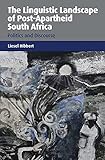TheLinguistic Landscape of Post-Apartheid South Africa : Politics and Discourse / Liesel Hibbert.
Material type: TextPublisher: Bristol ; Blue Ridge Summit : Multilingual Matters, [2016]Copyright date: ©2016Description: 1 online resourceContent type:
TextPublisher: Bristol ; Blue Ridge Summit : Multilingual Matters, [2016]Copyright date: ©2016Description: 1 online resourceContent type: - 9781783095803
- 9781783095810
- LANGUAGE ARTS & DISCIPLINES / Linguistics / Sociolinguistics
- ANC
- African National Congress
- African languages
- Democracy
- Discourse analysis
- Government
- Heteroglossia
- Linguistic identity
- Linguistic landscape
- Oral tradition
- Political rhetoric
- Politics
- Post-Apartheid South Africa
- South Africa
- South African Black English
- Translanguaging
- 306.44/968 23
- P119.32.S6
- online - DeGruyter
- Issued also in print.
| Item type | Current library | Call number | URL | Status | Notes | Barcode | |
|---|---|---|---|---|---|---|---|
 eBook
eBook
|
Biblioteca "Angelicum" Pont. Univ. S.Tommaso d'Aquino Nuvola online | online - DeGruyter (Browse shelf(Opens below)) | Online access | Not for loan (Accesso limitato) | Accesso per gli utenti autorizzati / Access for authorized users | (dgr)9781783095810 |
Contents -- Preface -- Introduction -- 1. The Release of Nelson Mandela as the Advent of Democracy -- 2. Shifts in the Linguistic Landscape, post 1994 -- 3. Linguistic Changes in Parliament 1994-1998: Paving the Way for Linguistic Democracy -- 4. Reconfigured Features of the African Oral Tradition -- 5. Recontextualised Residues of Rhetoric from the Previous Era -- 6. Historical Explanations for Literacy Backlogs in South Africa -- 7. Black South African English Versus Other African Englishes in the 1990s -- 8. The Rhetoric of Pan-Africanism and the African Renaissance -- 9. The Debate on African Identity in South Africa -- 10. Expressions of Neo-Traditional Patriarchy in the Speeches of President Zuma -- 11. Return to Self-Censorship in Political Journalism: Echoes of the 1950s and 1960s -- 12. Localisation Initiatives -- 13. The Position of African Languages -- 14. Superdiversity and Translanguaging: A New Discursive Order -- References -- Index
restricted access online access with authorization star
http://purl.org/coar/access_right/c_16ec
The appointment of Nelson Mandela as President of South Africa in 1994 signalled the end of apartheid and transition to a new democratic constitution. This book studies discursive trends during the first twenty years of the new democracy, outlining the highlights and challenges of transforming policy, practice and discursive formations. The book analyses a range of discourses which signal how and by what processes the linguistic landscape and identities of South Africa's inhabitants have changed in this time, finding that struggles in South African politics go hand in hand with shifts in the linguistic landscape. In a country now characterised by multilingualism, heteroglossia, polyphony and translanguaging, the author debates where the discourse practices of those born post-1994 may lead.
Issued also in print.
Mode of access: Internet via World Wide Web.
In English.
Description based on online resource; title from PDF title page (publisher's Web site, viewed 24. Apr 2022)


